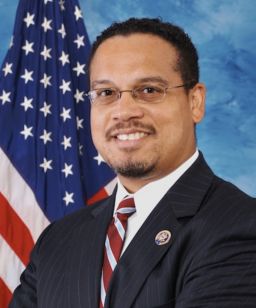Editor’s Note: Keith Ellison represents Minnesota’s 5th District in Congress and is deputy chairman of the Democratic National Committee. The views expressed here are solely the author’s.
In 1968, more than 1,000 garbage collectors walked off the job in Memphis, Tennessee, to protest poverty wages, unpaid overtime, and poor – sometimes lethal – working conditions. Last month, West Virginia public school teachers in all 55 counties did the same – not out of symbolism, but of urgent necessity.

It’s been 50 years since the sanitation workers strike and a lot has changed, but at least two things have stayed the same: Public employees are undervalued, and when workers join together, they win.
As we think back on the legacy of Martin Luther King Jr., who was killed in Memphis after traveling there to support the striking sanitation workers, it’s clear that we have made substantial progress. Black people got the vote, and Jim Crow segregation laws for housing, work and public places have been defeated.
But in some ways, King’s fight for economic and racial justice has clearly slipped backward, and America’s working people feel it.
The minimum wage in 1968, after being adjusted for inflation, would be $11.62 in today’s dollars. But today’s federal minimum wage is just $7.25. That’s losing ground. In 1968, CEOs made just 20 times the salary of their average worker, according to the Economic Policy Institute. Today, according to the Institute for Policy Studies, it’s over 300 times. And while the top 1% of income earners’ share of the national income has nearly doubled since 1968, the number of Americans in poverty has increased by 60%.
Inequality is no theoretical concept; the fortunes of working people have taken a hit in the last 50 years.
The teachers in West Virginia – and the thousands of teachers in Oklahoma who walked out of their classrooms and onto the state Capitol last week – were protesting decades of stagnant wages. Adjusted for inflation, the average teacher salary in West Virginia for the 2016-2017 school year was less than it was during the 1999-2000 school year. Meanwhile, the costs of goods that teachers spend the majority of their salary on – food, housing and health care – have increased.
But teachers in Oklahoma and West Virginia were also protesting a government that no longer works for them. As economic inequality has increased, so has political inequality. As a result of the “budget crisis,” which state government officials in Oklahoma created by giving massive tax cuts to oil and gas companies, many school districts had to cut a full school day.
Politicians beholden to powerful lobbies would rather kids have four-day school weeks and packed classrooms than ask their donors to pay a fair share of taxes. This is nothing new. The Oklahoma Legislature has been cutting education spending for years.
Over the last 10 years, per student funding has dropped by nearly 30% in the state when adjusted for inflation, according to the Center on Budget and Policy Priorities. As a result, Oklahoma students have endured textbook shortages, outdated learning materials and crumbling schools that are unfit for learning.
In West Virginia, tax cuts led to half a billion dollars a year in lost revenue. Not much was left over for books or a fair wage for teachers. The state’s teachers – who rank 48th out of 50 states in pay – and the students they teach every day, bore the brunt. West Virginia and Oklahoma are not unique.
According to the Center on Budget and Policy Priorities, in 2015, 29 states had lower per student funding than in 2008.
The outlook in Washington, D.C., is no different. The Republican tax bill passed late last year will drive up budget deficits by $1.7 trillion in coming years, according to the Congressional Budget Office, and Republican leadership has already called for cuts to education and health care funding to pay for them.
By permanently lowering the corporate tax rate from 35% to 21%, Republicans in Washington sent a clear message to the American people: The government will help you if you are a CEO or a corporate lobbyist, but if you are a public school teacher or a factory worker, you are on your own.
No wonder we’re seeing working Americans take to the streets in record numbers: teachers’ walkouts, the March for our Lives, Black Lives Matter, the Women’s March, and the tens of thousands of Americans who protested Republicans’ attempt to gut the Affordable Care Act.
All have taken a stand against elected officials who have abandoned the interests of the voters who elected them. Voters overwhelmingly support higher wages, affordable health care, women’s reproductive rights and gun safety. It’s some of their elected officials – who are beholden to corporate interests – who are blocking the public interest.
But by taking a stand and winning, public school teachers and other protesters are fighting back against the war the greedy are waging on everyday folks in this country, just as the Memphis sanitation workers did 50 years ago.
These threats to our democracy and our workplaces come in the midst of new voting restrictions that exclude people of color and the poor from participating in elections, as well as ongoing attempts by state governments and the US Supreme Court to strip away workers’ ability to organize their workplaces.
But if the strikes in West Virginia and Oklahoma – two “right to work” states that have passed laws to make it harder for workers to come together and fight for their shared interests – have taught us anything, it’s that the power of organizing can overcome almost any obstacle in its way.
They have also reminded us of a history lesson that King and sanitation workers in Memphis taught us 50 years ago: Real power is with the people. We can take back our democracy, and our workplaces, if we join together.



